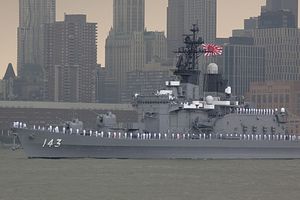Never one to sit back after a political victory, Japanese Prime Minister Shinzo Abe is pushing ahead on two fronts now that the Cabinet has reached a unified position on collective self-defense. He is intent on strengthening the U.S.-Japan alliance and expanding the Japanese role in that relationship. He is also seeking to have the Diet begin deliberations on the issue, in order to have the new interpretation of Japan’s Constitution become part of the new Japan-U.S. Defense Cooperation Guidelines to be revised late this year. The speed of Abe’s actions shows that he is determined to enshrine this new capability as quickly as possible, much as he did after Japan lifted its ban on military exports.
Abe’s comments to aides in late June, when negotiations with coalition partner New Komeito were winding down and it was clear the Cabinet would reach an agreement, show how he views the future of relations with the U.S. military. According to the Japan News, Abe said “The Japan-U.S. alliance will enter into a different sphere, as the exercise of the right of collective self-defense will become a great deterrent.” On Tuesday during a press conference, Abe said a senior U.S. official had urged him to “seriously consider whether the U.S. public would continue to trust Japan if a Self-Defense Forces’ vessel did not take any action when a nearby U.S. vessel that was protecting Japan came under attack.” Abe also reportedly told his aides that Japanese Maritime Self-Defense Forces will eventually become involved in U.S. Seventh Fleet operations, which will have significant meaning for U.S.-Japanese relations and the region at large.
On the legal front, the Budget Committee of both the lower and upper houses of the Diet will meet on July 14 and 15, respectively, to discuss the new interpretation of collective self-defense, with Abe to attend both sessions according to the Jiji Press. The government is also establishing a team within the National Security Secretariat to draft legislation that will present its views on the scope of collective self-defense. While some have urged establishing a legal framework through legislation that would be submitted during the regular Diet session next year, a senior Defense Ministry official said that, in order to clarify the role of the SDF, “The overall vision for related legislation needs to be compiled as soon as possible.” This likely means that the Abe administration will want effective legislation passed during the extraordinary Diet session this fall.
So far the LDP lead government has not made any concessions about its decision to implement the new collective self-defense interpretation. The only hint came from LDP Vice President Masahiko Komura when speaking to reporters: “It is true that we still have not obtained sufficient understanding from the public. We will fulfill our responsibility to obtain their understanding.” However, after months of making its case before the public, it’s unclear what the Japanese people fail to understand, or how the government will go about clarifying their views.
































